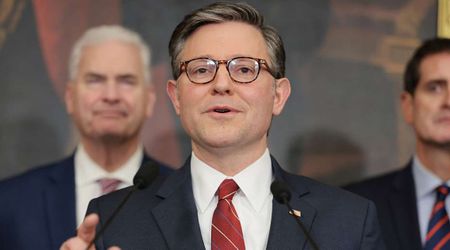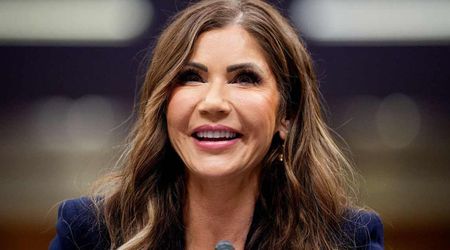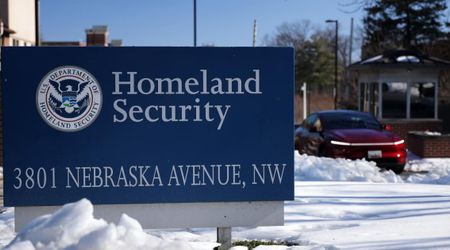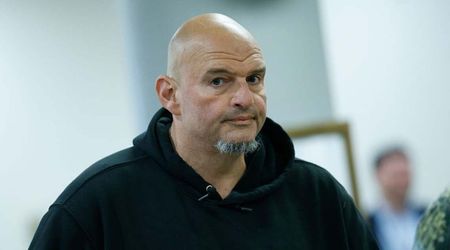Tim Walz under fire for 'aggressively' pulling at son Gus on DNC stage soon after emotional viral moment

CHICAGO, ILLINOIS: The internet was abuzz Wednesday evening, August 21, with the heartwarming reaction of Gus Walz — son of Democratic Minnesota Governor Tim Walz — to his father's vice presidential nomination during the Democratic National Convention.
As Governor Walz delivered his keynote address, he took a moment to acknowledge his family, turning to them and saying, "Hope, Gus, and Gwen, you are my entire world, and I love you."
This brought the 17-year-old Gus to his feet. Flanked by his 23-year-old sister Hope and his mother Gwen in the front row of Chicago's United Center, Gus was visibly moved to tears. Overcome with emotion, he yelled, "That's my dad!"

Controversy surrounding Gus Walz's tender moment
Following the speech, the Walz family joined Governor Walz on stage, where Gus embraced his father in a bear hug. However, not all the attention was positive.
As the Walz family stood together on stage, some viewers noticed what they perceived as Governor Walz "aggressively pulling" Gus's arm.
Tim Walz is under fire for aggressively pulling his son Gus Walz’s arm on stage at the Democratic National Convention.
— Collin Rugg (@CollinRugg) August 23, 2024
The incident was apparently filmed on the third day of the event (Wednesday), the same day Walz gave his speech.
Gus is 17-years-old and reportedly has a… pic.twitter.com/5yMWpgy8Ur
This sparked quite a wave of backlash online, with many expressing concern over the governor's behavior.
"That was not a kind pull," one posted on X.
"That was clearly abusive and domineering," another wrote.
"Tim’s aggressive demeanor [and] facial expression during the 'tug' says it all. A little preview of who he truly is," a third user alleged.
"That is not a look of excitement. This was in public. On a stage. That is a sign of losing control in anger," someone else offered.
"Micro expressions are very telling. Yes, Walz did yank his son towards him," a comment read.
"Tim showing his true colors, looks very unnecessary. Glad he put it on display for all of America to see," another chimed in.
That was clearly abusive and domineering.
— EleventySigma CygnusAtratus (@eleventysigma) August 23, 2024
Tim’s aggressive demeanor facial expression during the “tug” says it all.
— Derrick Shields (@DerrickShieldsX) August 23, 2024
A little preview of who he truly is.
That is not a look of excitement. This was in public. On a stage. That is a sign of losing control in anger.
— Andre Nuta 🇺🇲 (@andre_nuta) August 23, 2024
Micro expressions are very telling. Yes, Walz did yank his son towards him.
— KingAlex 🇺🇸 🏴☠️ (@0xKingAlex) August 23, 2024
Tim showing his true colors, looks very unnecessary.
— just1n (@just1nvest) August 23, 2024
Glad he put it on display for all of America to see.
Understanding Gus Walz's condition
The 17-year-old has been diagnosed with ADHD, an anxiety disorder, and a non-verbal learning disorder, according to his parents.
The non-verbal learning disorder, which Governor Walz refers to as his son's "secret power," is a condition shared by millions of Americans. Despite affecting an estimated 3% to 4% of the population, it remains less understood than other conditions like ADHD.
"When our youngest Gus was growing up, it became increasingly clear that he was different from his classmates," Tim and Gwen told People in a statement. "Gus preferred video games and spending more time by himself."
"When he was becoming a teenager, we learned that Gus has a non-verbal learning disorder in addition to an anxiety disorder and ADHD, conditions that millions of Americans also have," they explained.
"Like so many American families, it took us time to figure out how to make sure we did everything we could to make sure Gus would be set up for success as he was growing up," the couple said.
"It took time, but what became so immediately clear to us was that Gus’ condition is not a setback — it’s his secret power," the Walzes added.
According to the Journal of the American Medical Association (JAMA), as many as 2 million children and adolescents in North America may have a non-verbal learning disorder. The condition is often misunderstood due to its name.
Children with this disorder can speak and often exhibit strong verbal skills. However, their challenges lie in processing non-verbal or visual information.
Marcia Eckerd, a licensed psychologist specializing in autism spectrum disorder and anxiety, explained to Psychology Today that the difficulty is in understanding the nuances of a conversation rather than the ability to engage in one.
According to the NVLD Project at Columbia University, people with non-verbal learning disorder “struggle with a range of conditions that include social and spatial disabilities. Often they are marginalized and isolated; consequently, they can experience social barriers throughout their lives.”
This article contains remarks made on the Internet by individual people and organizations. MEAWW cannot confirm them independently and does not support claims or opinions being made online.










